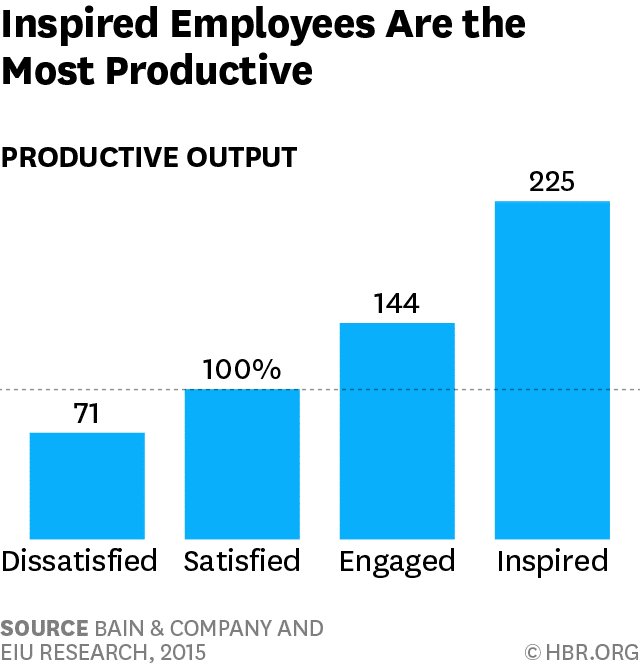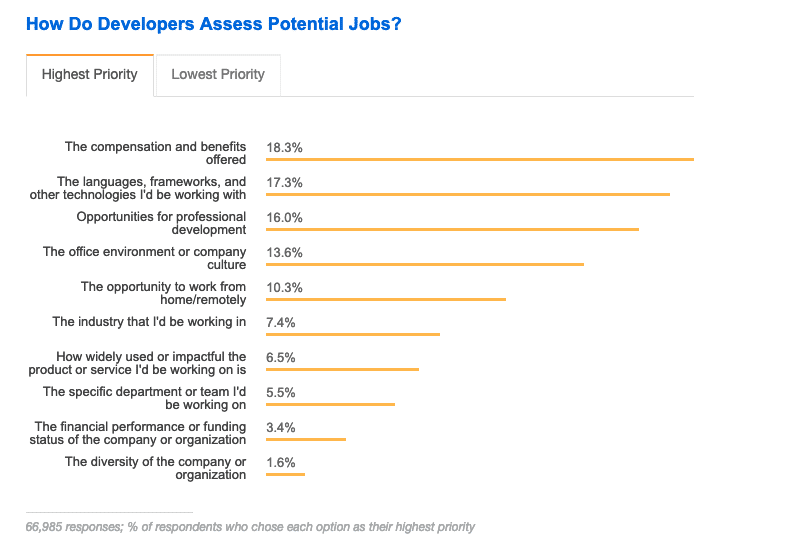7 Reasons Why You Need to Invest in Technical Talent
It is becoming increasingly difficult to attract and retain talent in the digital age. Now more than ever it’s vital to invest in your technical talent. We’ve written this list to summarise 7 key reasons why you need to invest in your technical talent.
Reduce turnover
We know how stressful it can be to lose talented employees and the challenge it is to have them stay. In 2017, the technology industry faced the highest turnover rate (13.2%) of any sector. The reality is that today’s job market is highly competitive with talented people expecting more from their employers. Even tech titans and disruptors struggle to retain talent. The average tenure is less than 2 years at companies such as Amazon, Google and Airbnb.
It proves that money isn’t everything. Your employees want more than cash. Stack Overflow’s 2018 developer survey of over 100,000 developers revealed some interesting insights. When asked how they assess potential jobs, ‘compensation and benefits’ was the number one priority with 18.3%, however closely following this was ‘languages, frameworks, and other technologies I’d be working with’ at 17.3%. The next three priorities for developers had nothing to do with money or tech stack, 16% of devs want to see professional development, 13.6% care about their company culture, and 10.3% want the flexibility to work from home.
Source: Stack Overflow’s 2018 Developer Survey
You may get developers in the door with a nice paycheck, but there’s a whole host of other things they genuinely care about that you should take note of.
An increase in productivity
Investing in your team increases productivity. Studies show that employees productivity is higher or lower depending on how they feel. Most companies aim for satisfied employees, which makes sense, right? What if I told you that engaged employees have a productive output rate of 144%, and an inspired employee’s productive output rate sits at an impressive 225%.

Source: HBR, Engaging Your Employees is Good but Don’t Stop There
How does a business inspire its employees? Stick to a sense of purpose, many companies lose track of their purpose and mission. To communicate the purpose to the broader team, enable inspirational leadership by equipping managers within the organisation the right training and tools they need to succeed. Businesses need leaders who value both performance and inspiration, just as a great place to work requires both high performance and high engagement.
Greater innovation
Besides an increase in productivity, inspired employees are also more likely to innovate. Google’s 20% Time program allowed its engineers to spend the equivalent of one day a week (or 20% of their working week) on a personal project. Many of Google’s products are a result of this now retired program, including, Gmail, Google Maps and Adsense.
The most important thing you can do as a company is to invest in the time and space for your employees to have breathing room. It is in this space that they can experiment and play with new ideas.
Fosters leadership
Investing in your talent results in an increase in leaders within the organisation. By developing and nurturing your team, they’ll not only be better at their jobs, but they’ll also stay with you longer.
It’s alluring to spend our budgets on minimum skills and basic knowledge, instead, consider people on your team who could benefit from executive coaching, leadership conferences or in-house opportunities. Throwing your money at learning and development without a strategic plan may work short-term, but investing in key players in your team can produce far greater results long-term.
Ultimately you should provide everyone in the company learning and development opportunities, but make sure that you identify emerging leaders and give them the tools they need to succeed.
Market adaptability
In a world that is continually changing, adaptability is one of the most important traits an employee can have. Many companies are aware that they need to prepare for uncertainty, yet few seem to realise their greatest asset is their people.
When the going gets tough, and new problems emerge, problem-solving is vital to adapt to new markets or environments. We know capable, well-trained employees are better at dealing with uncertainty and changing situations. They are able to approach a variety of situations with calm resolve and a willingness to work with what they have, to get the best possible outcome.
Thankfully, as a business leader, you can empower this behaviour by investing in creating autonomous employees, and removing unnecessary levels of bureaucracy.
Happier customers
Investing in your technical talent has an outcome you may not initially think of. Simply put, happy employees equal happy customers. Tech giant Salesforce is an excellent example of a company who understand this and have put substantial effort into making their employees happier.
There is evidence to support the idea that happier employees lead to more satisfied customers. Salesforce is just one example of a company who not only has excellent employee satisfaction, but their customers love them too. They have taken out the number one spot in the Best Place to Work annual survey in 2016 and in 2018. Salesforce also consistently rank highly with their customers, priding 10,574 reviews with an average score of 4.3/5 on Software Advice.
Source: Salesforce on Software Advice
So how do Salesforce keep their employees happy? Salesforce doesn’t focus on tangible perks, but rather on a sense of purpose. On their first day of work, Salesforce employees spend it helping others through service work. They’re also given 56 paid hours a year to volunteer in their community. Salesforce CEO Marc Benioff said, “I want a company where people are excited to come to work every day, where they feel good when they get here, where it doesn’t take from them, but it’s giving to them, it’s giving to others”.
Consider how you can best make your employees happy, and see your customer satisfaction skyrocket.
Competitive advantage

What’s the most important reason to invest in your technical talent? All previous points on this list lead to competitive advantage, something that will indeed set you apart from your competitors. Unlike tools and processes, you can’t replicate people.
When you invest in your employees, great things happen. Besides the increase in retention, productivity, innovation, leadership, adaptability and customer satisfaction, you’ll develop a competitive advantage. By creating an awesome workplace, you’ll attract the best talent, and the best talent will stay.
At 4mation we’ve committed to increasing our investment in talent. We have invested in learning and development in both formal and informal settings. In 2018 we launched a new set of values which we feel inspire the thoughts and behaviours that resonate with our people and improve our business. We also initiated individual skills and competency profiles that will inform personal development plans for each of the teams.
On top of this, 4mation launched the Metrics Value People (MVP) program, which recognises key contributors to 4mation. The first recipients will be heading off to the SXSW in Austin, TX in March 2019 to immerse themselves in 10 days of innovation and creativity. Additionally, we will also plan to launch our own social impact program in 2019. This will help us to serve our wider community better.
If you want some of the best talent in Sydney to work on your project, talk to us today.









